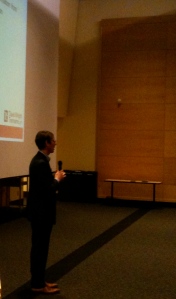Demonstrating once again there is no protection from one’s own stupidity, social media brings home the message of shortsightedness in a very special way—the gift that keeps on giving with online presence that cannot always be removed. Kraig Baker, lawyer and UofW MCDM adjunct faculty member, provided a brief outline of social media’s legal considerations at the Seattle Arts & Lectures U Storyteller Uprising lecture at Kane Hall, UofW last week.
The fine print that we tend to not really read before accepting terms of conditions to use a social media site, like Facebook, may mean that while we still own our images and content, by agreeing with the terms, we allow use by the site we are posting at—even after we remove our account.
Here I submit the wisdom of mothers and bosses everywhere, and hopefully the topic of a future lecture: there is no free lunch. Consumers’ information is being monetized in ways the average American can’t even really even dream of, but someone has, and is, using our data breadcrumb trail right now. Two examples of this, which Kraig cited, are Facebook’s Beacon project and Google’s Buzz.
My takeaway is clear:
If it’s free, social media hosts are getting their money and benefit from users in another way, frequently through a means which users do not understand.
Along with this comes certain types of suggestive actions that almost look like entrapment….for instance, I recently was visiting an unnamed social media site (which just had a movie made about it) and got a notice advising me my account was not secure…. following the click path, I was informed my account was not secure because I had failed to provide a phone number. Having seen my friends personal information published not long ago at this same site when a new service was added, I ignored this request.
Word: if you don’t want it published ever, don’t provide to social media accounts.
Kraig discussed some of the long-term ramifications of online posting. For instance, how others can modify a posting. An example Kraig mentioned was of a college classmate who posted a photo of a friend many years ago at a party where he was—uh, having a really good time—this photo was tagged and now shows up, embarrassingly, in his photostream.
I hope SAL U and the MCDM program will return to offer a thorough exploration into privacy and the monetization of consumer information—both very deep and in the midst of proposed legislation.
Next Storyteller Uprising dates/topics:
MARCH 23: Scott Macklin
Building Organizational Capacity through Convening Community Stories

